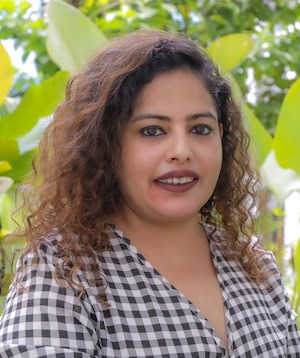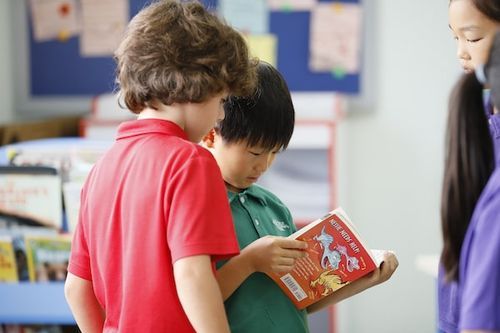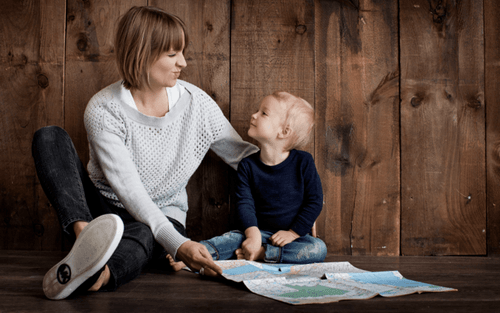One of the core experiences of the International Baccalaureate Primary Years Programme (IB PYP) is transdisciplinary learning. With this innovative approach, students study various subjects under one theme. They also gain vital skills, which they apply as they work collaboratively with their peers. These skills encourage students to take responsibility for their learning as they ask questions to understand the world around them and explore topics that interest them. Here’s an overview of transdisciplinary learning and what it looks like in action at OWIS.
What Is Transdisciplinary Learning?
-min.png)
Transdisciplinary learning enables your child to build concepts and skills across subject areas, rather than studying subjects in isolation. Subjects are distinct, yet interconnected, allowing for a holistic learning experience in which students apply what they’re learning in a variety of contexts.
The IB PYP encompasses six transdisciplinary themes of global importance.
- Who we are
- Where we are in place and time
- How we express ourselves
- How the world works
- How we organise ourselves
- Sharing the planet
These themes enable our primary school students to explore topics beyond individual subjects to see how they apply in the real world. Examining issues across subject areas makes it possible to analyse them from multiple perspectives. Hence, the different themes and subject areas enhance the learning rather than limit it.
What Are Transdisciplinary Skills?
One of the most important components of the PYP is transdisciplinary skills, also known as Approaches To Learning (ATL). These are skills that children develop through the learning process. They are broken down into five categories, and each category consists of several sub-skills.

Thinking Skills
- Knowledge acquisition
- Comprehension
- Application
- Analysis
- Synthesis
- Evaluation
- Dialectical thought — considering issues from multiple perspectives and arriving at a reasonable conclusion
- Metacognition — understanding one’s thought processes
Self-management Skills
- Gross motor skills
- Fine motor skills
- Spatial awareness
- Organisation
- Time-management
- Safety
- Healthy lifestyle
- Codes of behaviour
- Informed choices
Communication Skills
- Listening
- Speaking
- Reading
- Writing
- Viewing
- Presenting
- Non-verbal communication
Social Skills
- Accepting responsibility
- Respecting others
- Cooperating
- Resolving conflict
- Group decision-making
- Adopting a variety of roles
Research skills
- Formulating questions
- Observing
- Planning
- Collecting, recording, organising and interpreting data
- Presenting research findings
Students work independently and in groups of varying sizes and compositions. This allows them to develop these sub-skills further as they encounter different viewpoints and analyse topics from a variety of angles.
What Does Our Transdisciplinary Approach Look Like at OWIS?
At OWIS, we provide students with authentic, hands-on learning opportunities so they can develop their transdisciplinary skills and take ownership of their learning. Here’s a behind-the-scenes glimpse of what you can expect when your child engages in transdisciplinary learning.

How the World Works
For the transdisciplinary theme “How the world works”, students considered how the design of structures depends on several factors. To put their learning into action, primary students decided to create structures that members of our school community could use. Some of them built dollhouses for our Early Childhood students and presented them to our early learners to play with. Other students gathered recycled materials and headed to our sports field to build a shade, using these recycled materials, near the athletic area. The shade protected students who were using the sports grounds, from direct sunlight, during PE breaks.
How We Organise Ourselves
The theme “How we organise ourselves” led our Grade 3 students to enquire into how organisations meet human needs and solve problems. The class formed several micro-groups dedicated to raising money for the World Wide Fund for Nature (WWF) . Students adopted seven different animals in collaboration with the WWF. To obtain the necessary funds, they held a fun-fair, selling items like slime, used books, rainbow looms, lemonade and so on. Students then donated the proceeds to the WWF.
Sharing the Planet
Under the transdisciplinary theme of “Sharing the planet”, our Grade 3 students explored topics around the central idea that water is a resource shared by all living things. To protect marine life and surrounding ecosystems, they organised a beach clean-up at East Coast Park, Singapore. Parents, teachers and students of OWIS enthusiastically participated in the clean-up activity organised at the beach.
As you can see from these examples, the projects that evolve from these transdisciplinary themes incorporate a variety of subject areas. Learning is meaningful, challenging and relevant as it centres on real-life issues. Teachers act as subtle facilitators. They provide enough guidance to keep children on track. At the same time, they give students enough autonomy to initiate and direct their own learning.
Transdisciplinary learning in the IB PYP goes beyond traditional subject areas so students can see the bigger picture surrounding topics of global significance. Learners develop a deep understanding of universal and transferable concepts. Our transdisciplinary approach shows students how complex issues are inter-connected and highly relevant. Our hands-on learning model has real-world implications, as students can use their transdisciplinary skills in any situation. Hence, the IB PYP provides children with essential skills applicable within and well beyond the classroom, equipping them to be critical thinkers, problem-solvers and lifelong learners.
To learn more about how the IB PYP can enrich your child’s learning experience, contact us to schedule a virtual school tour.
* The images in this blog were taken in Pre-Covid times.















